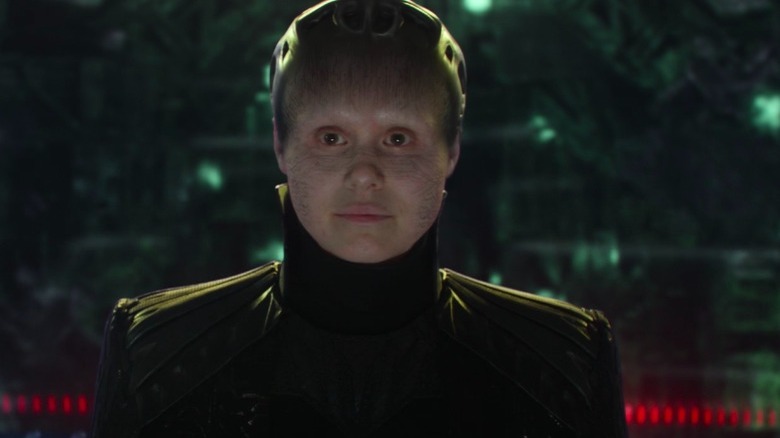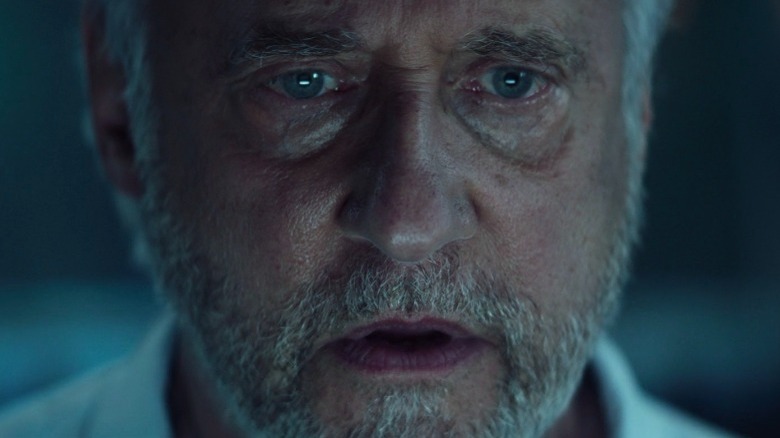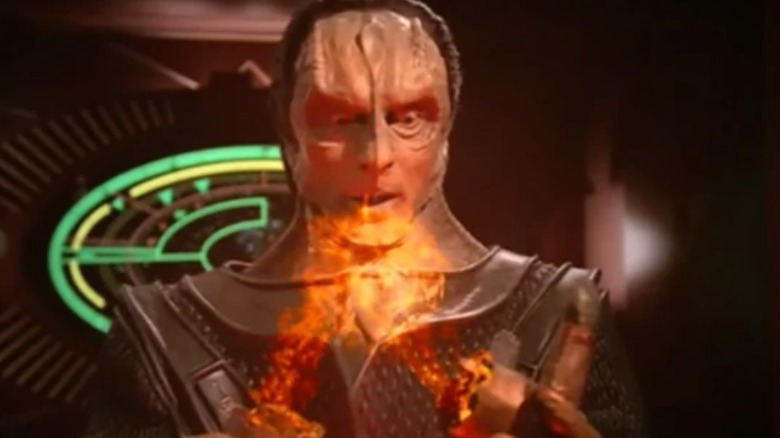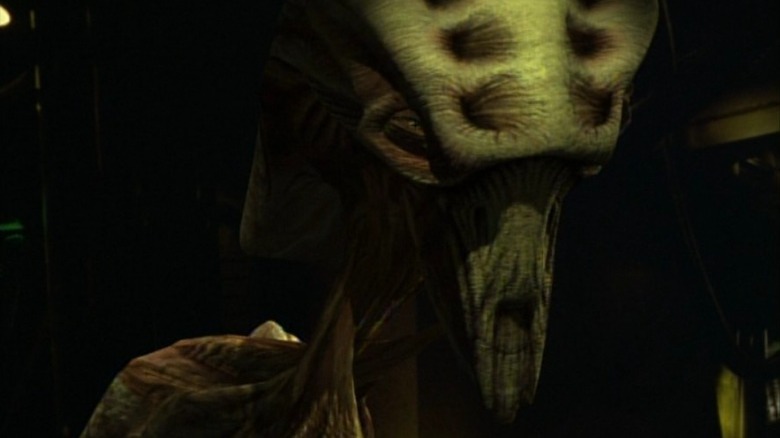Every Theory About What's Going On With Jack Crusher In Star Trek: Picard Season 3
This post contains spoilers for "Star Trek: Picard" season 3 episode 8.
Jack Crusher (Ed Speleers) is straight-up not having a good time. The long-lost son of Jean-Luc Picard (Patrick Stewart) and Beverly Crusher (Gates McFadden) has gone full post-Upside-Down Will Byers in the latest episodes of "Star Trek: Picard." He's haunted by visions of branch-like tendrils and a red door, plagued by nightmares, and in possession of some strange energy that turns his eyes red. He also seems to be developing superpowers; Jack took down a whole crew worth of Changelings as if on autopilot, and he can talk to Sidney La Forge (Ashlei Sharpe Chestnut) with his mind.
With Deanna (Marina Sirtis) finally on the case, it looks like we'll find out about Jack's mysterious past next week, and if "Star Trek: Picard" keeps up the trend its established in its first two seasons, a major Trek-verse reveal is sure to follow by the finale. At the end of episode eight, Deanna proclaims: "there's a darkness with that boy." She clarifies that he's not to blame, saying that the voice is "not in him but around him, passing through him, and a voice inside him, ancient and weak, but a voice that isn't his own." Then she sits with Jack in hopes of figuring out once and for all what's behind the red door.
Theories about Jack's true nature abound among "Star Trek" fans, ranging from the likely to the outlandish. While we'll have to wait at least a week to get to the bottom of Jack's backstory once and for all, that just gives us even more time to parse through every possible option. Here's every theory we can think of about what the heck is up with Jack Crusher.
Jack has Borg genetic material
Back in 2366, Picard was forcibly assimilated into the Borg Collective, the powerful, dangerous cyborg hive mind that is constantly in world domination mode. There, Picard's body was taken over and renamed Locutus, and while he has long-since shed his Borg status, the Starfleet officer has been haunted by his experiences with the Borg ever since. While the Borg got a positive PR makeover at the end of last season after Alison Pill's Jurati took over as Borg Queen, season 2 co-showrunner Terry Matalas has since confirmed on Twitter at the time that hers was an alternate timeline offshoot, meaning the real Borg is still a real threat.
One of the most popular and evidence-backed theories about Jack Crusher is that Picard's biological material was altered by his Borg experience, leading to his conceiving a baby with latent Borg-like abilities. We've seen before that Borg are capable of assimilation on a microscopic level via nanoprobes, and it's possible that a bit of Borg remained in Picard even after he left the collective behind.
This would explain a lot of things about Jack, including his ability to have a hive mind-like experience with Sidney, his ability to take over a crew member's motor functions, and Vadic's (Amanda Plummer) comment in response: "Look at you, finally living up to all your potential." There's also the quickly-glossed-over fact that Data (Brent Spiner) tells the crew that Altan Soong (also Spiner) found an "anomalous form" in Picard's body that makes his initial Irumodic Syndrome diagnosis questionable. Could the form be residual Borg material?
Jack is related to Project Khan
There's also the possibility that Jack's origin could herald back to another great "Star Trek" character; Khan. While Khan Noonien-Singh has been dead for a long time when "Star Trek: Picard" picks up, the villain's name appeared on a paper file that Soong appeared interested in during the show's season 2 finale. It was labeled "Project Kahn," and we haven't heard anything about it since. Is it possible that Soong or someone who worked under him purposely created a genetically modified human with special abilities?
While season 3 hasn't mentioned Khan at all, "Star Trek: Picard" co-creator Alex Kurtzman did compare this season's villain to Khan at Comic Con last year. While he appears to have been referencing the mind games unfolding between Vadic and Picard, it's possible the reference was more literal than Kurtzman was willing to let on. If Jack did have these shadowy origins, it would make sense for him to lead a planet-hopping life, for Vadic to have a vested interest in finding him, and for him to end up with a unique, still-mysterious medical diagnosis like Irumodic Syndrome.
In this theory, as with several others, the red door in Jack's head is simply a mental block keeping his repressed memories in check. This type of mental visualization is commonly used in regression therapy and other methods used to dive deep into past traumas.
Jack is a Changeling (in either sense of the word)
With all the talk of Changelings this season, it would be weird to not explore the possibility that they may have something to do with Jack Crusher. After all, they went to great lengths to hunt the man down, and Vadic said she wants to bring Jack to "where he most belongs." If he somehow has Changeling-related genetic material, that would be in the Great Link, the place where all Changelings live in their liquid form.
If Jack were somehow part-Changeling, his ability to control others' bodies would make sense, as would the voices that seem to urge him to come to them. In this case, the red door that haunts his subconscious mind could be the entryway to the Great Link, a place that some part of him knows he needs to return to even as he remains in human form. This isn't the tidiest theory (how would Jack have become part-Changeling in the first place?) and it's also not the most interesting, but it's nonetheless a slight possibility.
Pretty much every theory on this list could also be supplemented by the idea that Jack is the traditional type of Changeling — a baby who was swapped at birth for an imposter. If the real Jack Crusher was switched out for a genetically modified baby (whether he's part-Changling or part something else entirely), it would make sense that the people who put him there long ago would come looking for him years later.
Jack is the key to Picard's future evolution
It would also make sense for "Star Trek: Picard" to bow out with something huge, giving the beloved captain a send-off that rocks the world of "Star Trek" forever. So why not ascension? Often portrayed as a sort of evolutionary leveling-up into pure energy, ascension is a beautiful transformation that also looks like a death of sorts. It's appeared a few times throughout "Star Trek," though it's sometimes called transcendence, too.
In one of many Reddit posts in which fans have theorized about Jack's true nature, user Lokan posited that Picard might be experiencing Irumodic Syndrome because his synthetic body is unable to ascend. If any main character in "Star Trek" history seems wise enough to unlock the secrets to the next step of evolution, it might be Picard.
As another Reddit user points out, Q (John de Lancie) may have hinted at some grand purpose for Picard in the "Star Trek: The Next Generation" series finale, when he told Picard that his future entails "charting the unknowable possibilities of existence." Could Picard be on track to join the Q continuum? And while Picard 2.0 might not be able to evolve, perhaps Jack can — or his genetics can help his father figure out what's stopping the process.
Does this explain Jack's powers? Not in the slightest. Is it still a cool idea that gets to the heart of the compassion, curiosity, and limitless horizons that "Star Trek" is often all about? Definitely!
Jack is a human with a powerful genetic mutation
There's also a decent chance that Jack is actually fully human, but simply possesses a unique mutation that the Changelings have deemed important. We haven't heard about examples of Irumodic Syndrome outside of the Picard family, so there's a chance the disorder could actually be something genetic and unique that allows Jack to experience the world on a higher level than those around him. When Picard and Beverly point out Vadic's "advanced physiology," she shoots back, "What about your son? Do you know all about his physiology?"
Picard's own working theory around the time of Vadic's death was that the Changelings had a plan for him and Jack that involved his body (as in, the stolen one) and Jack's blood. This combination would be used to do something dastardly and potentially world-changing on Frontier Day. Is it possible that Picard has recessive traits that appeared in Jack, allowing him to either save or destroy humanity depending on who unlocks them first? It's a huge guess, but the fallout of another attack on Frontier Day could also be huge.
Jack is being controlled by the Pah-Wraiths
One of the most fun answers to Jack's mysterious visions would be one that doubles as a deep-cut reference to a totally different "Star Trek" show, and one that "Star Trek: Picard" has been paying homage to all season: "Star Trek: Deep Space Nine." In that series, a rather metaphysical presence called the Pah-Wraiths often took to possessing people, giving them dark visions and dreams not unlike the ones Jack has been experiencing all season.
The Pah-Wraiths first appeared in "Star Trek: Deep Space Nine" as a sinister offshoot of the Bajoran Prophets. Those mystical beings live outside of time and have the god-like ability to see the future. Their enemies, the Pah-Wraiths, have similar powers but seem to have become corrupted along the way.
The only problem with the potential inclusion of the Pah-Wraiths in "Star Trek: Picard" is that the show hasn't dropped hints about them at all, unless Commander Ro Laren's Bajoran earring — in which she hid a chip including secret research on the Changelings — counts. Eight episodes into the season, a Pah-Wraith appearance in a show that's never acknowledged their existence might feel a bit like a deus ex machina.
Jack is related to Species 8472
Physical mimickry has been a hot topic in "Star Trek: Picard" this year thanks to the Changelings, so it only makes sense that other species capable of impersonating their enemies have come up frequently in chatter around the show. Since the season's mysteries began to unfold, several Reddit users have name-dropped Species 8472, a powerful, Borg-killing alien race that appeared in "Star Trek: Voyager." Though members of Species 8472 look a lot more like a classic sci-fi movie alien than a humanoid being, they're also capable of communicating telepathically and disguising themselves as other life forms through advanced technologies.
The going theory among fans doesn't seem to be that Jack is actually part of Species 8472, but that he's perhaps been modified or infected by the ruthless and highly evolved species as a pawn in some larger conflict. This would align with Deanna's assertion that there's darkness "with" him but "not in him." However, this theory doesn't seem likely for the same reason that the Pah-Wraith theory seems doomed to fail; "Star Trek: Picard" hasn't re-introduced us to Species 8472, and it would be weird to drop them in at the last minute.
Jack is the Dawn Summers of it all
This whole season of "Star Trek: Picard" has hinged on our instant acceptance of Jack Crusher as Picard's long-lost son, but his appearance felt sudden. In fact, it was so sudden that it got me wondering: what if the series is taking a page not out of the "Star Trek" rulebook, but the "Buffy The Vampire Slayer" one?
In the fifth season of "Buffy," our hero suddenly gained a little sister, Dawn (Michelle Trachtenberg), whose inexplicable appearance remained unexplained for several episodes. While most "Trek" fans agree that it's likely that Jack's physiology was altered at some point, the common consensus seems to be that it was when he was a baby or before his birth. But what if Jack still is technically a baby? Is it possible that he blipped into existence a few years before we met him, just long enough ago to earn his reputation as a Federation criminal?
I'll be honest; there's really very little to support this theory besides my own distrust of main characters who appear way late in the game claiming to have a long history. If Jack were created as a teen or young adult, be it by a mad scientist or enemy of Picard, he and Beverly's actions would only make sense if they were lying or had their memories wiped (the latter of which might explain Beverly's voice in Jack's dreams).
Still, with so much timeline fiddling in the show's second season, not to mention both the vision whispers and Vadic referencing Jack's return to a place he's seemingly meant to be, it's possible Picard's offspring could have an inorganic origin story that doesn't line up with what we've heard so far.
It's probably the Borg thing, though.








